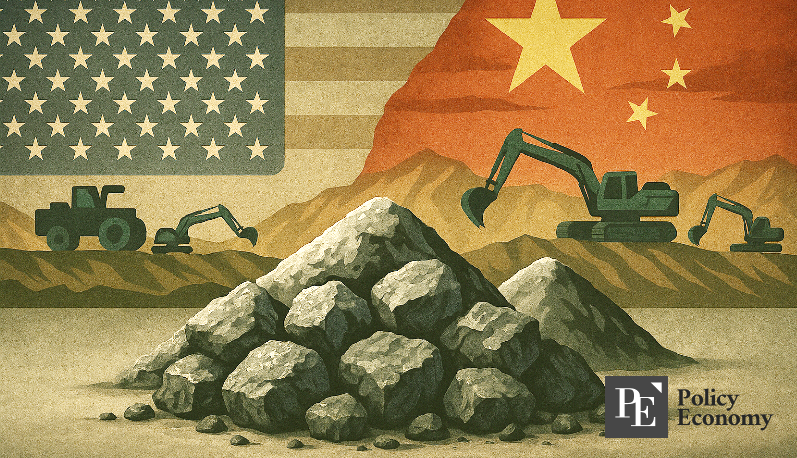China Issues Rare Earth Export Warning to Korean Firms Amid Intensifying U.S.-China Tech Conflict
Input
Modified
"Korean Companies Caught in Crossfire of U.S.-China Tariff War" "China Escalates 'Rare Earths Coercion'" "LS-Vietnam and POSCO Rushing to Secure Alternative Markets in the U.S."

In a significant escalation of the ongoing U.S.-China strategic rivalry, the Chinese government has formally warned Korean manufacturers not to export products containing Chinese-origin rare earth elements to U.S. military contractors. The move signals China’s intent to assert control over its strategic mineral exports far beyond its borders, placing South Korean businesses in an increasingly precarious position between two global superpowers.
China Enforces “Third-Party Export Controls” for the First Time
April 24, 2025 (Seoul )— According to sources within Korea’s industrial sector, leading Korean power equipment manufacturers have received official notices from Beijing warning that any product made with Chinese-sourced heavy rare earths and sold to U.S. defense firms may result in sanctions. One letter urged companies to provide assurances that their products would not be supplied to the U.S. military, adding that violations could carry punitive consequences. Although the specific penalties remain undefined, industry insiders interpret the warnings as a clear message that China may cut off rare earth supply to violators.
This is the first known instance of China enforcing third-party export controls on rare earths—a tool traditionally employed by the West, particularly the United States, to prevent sensitive materials from reaching adversarial nations. The move comes in response to the U.S. decision earlier this month to impose steep tariffs on Chinese goods and to ban exports of rare earth elements like neodymium, dysprosium, and terbium to 27 U.S. defense firms, citing national security concerns.
A Korean government official confirmed that similar notices have likely been issued to firms in other sectors such as secondary batteries, displays, electric vehicles, aerospace, and medical devices—industries heavily reliant on Chinese strategic minerals.
Korean Industry Scrambles to Respond
For companies like LS Electric and POSCO International, which have been heavily reliant on China for rare earth imports, the warnings mark a major inflection point. LS Eco Energy announced it is working with the Vietnamese government to establish a localized supply chain to reduce dependency on China. The company also disclosed plans to hire additional personnel and set up a dedicated rare earth trading division.
POSCO International, meanwhile, is looking to the United States for alternative sourcing. It recently signed a memorandum of understanding with U.S. firm Energy Fuels to procure neodymium-praseodymium (NdPr) oxide for use in electric vehicle motor cores. If sample tests prove successful, a long-term supply agreement is expected to follow. POSCO is also in discussions with California-based Rare Element Resources to explore further sourcing options.
Recognizing the systemic vulnerability, South Korea’s government has increased its strategic rare earth stockpile from six months to 18 months. Major manufacturers are also reportedly stockpiling rare earths to cover three to six months of production, aiming to cushion any immediate shocks.

R&D and Recycling Gaining Momentum
Efforts to develop rare earth recycling and substitution technologies are also underway. Hyundai and Kia have partnered with seven universities to operate a joint research lab focused on alternative materials and extraction techniques over the next three years.
As the geopolitical tug-of-war over high-tech supply chains escalates, Korean firms are being forced to make strategic calculations that could redefine their global production networks. With China leveraging its dominance in rare earths and the U.S. tightening export restrictions on semiconductors and advanced technologies, South Korea now finds itself on the front line of a deepening technological and economic divide.
The timing of China’s warning—just before a scheduled April 24 U.S.-Korea "2+2" trade dialogue—places further pressure on Seoul to clarify its strategic alignment. According to ING, if the current 46% U.S. tariff on Vietnamese exports persists and China maintains rare earth controls, Vietnam’s GDP could drop by up to 5.5%. For Korea, the implications may be even broader, affecting everything from industrial competitiveness to national security.
Amid an increasingly fragmented global trade environment, the ability of Korean firms to adapt swiftly—diversifying suppliers, investing in domestic capabilities, and leveraging diplomatic channels—will be critical in safeguarding their role in the next-generation industrial ecosystem.





















